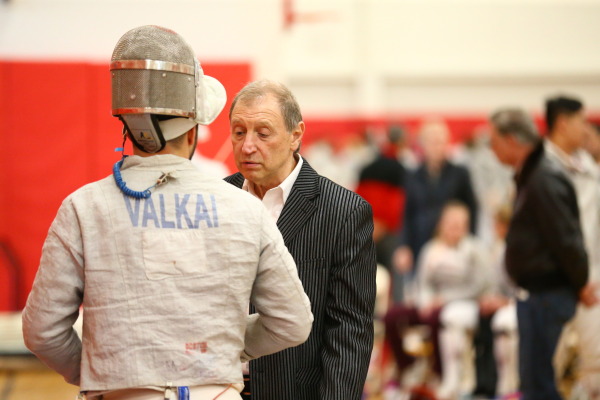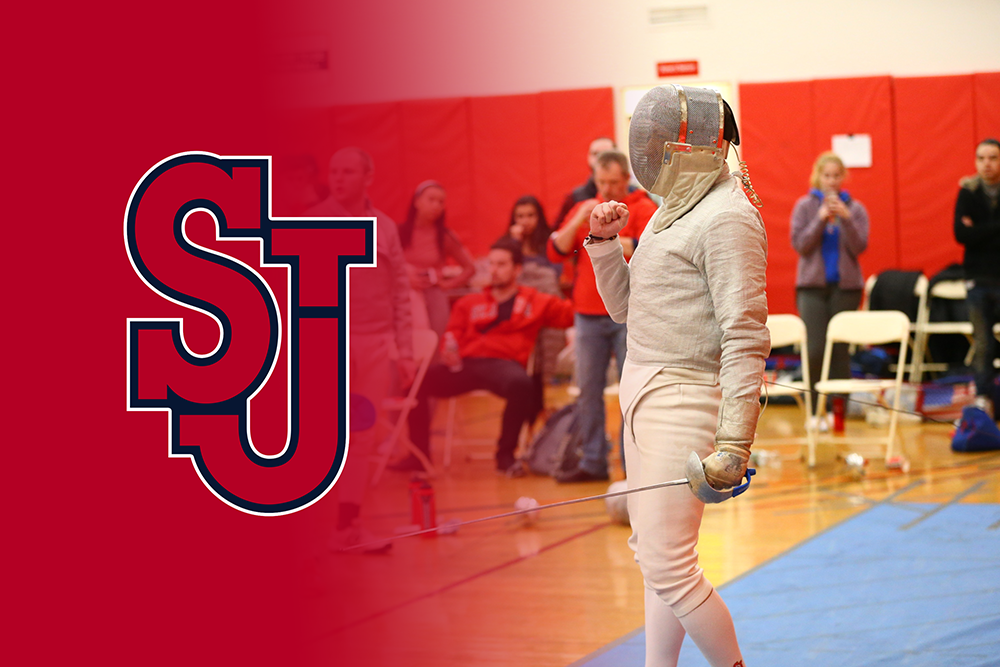St. John's University is recognized for its high academic standards and, above all, for its outstanding sports program. In recent decades, the school located in Jamaica, Queens has topped the front pages of local and national media mainly for its basketball and soccer team. However, there is one sport that despite its low media notoriety reaches success year after year: fencing.
Fencing is an organized sport involving the use of a sword (épée, foil or sabre) for attack and defense according to set movements and rules. It was one of the original nine sports in the inaugural modern Olympic Games in 1896 and one of only four sports that have been featured at every single Olympic competitions since 1896.
Fencing is a fast paced and unique sport with a rich history that, in St. John’s case, brought national and international recognition to the school with a decision made 23 years ago. It was 1995 when Yury Gelman was named Head Coach of Fencing for the Red Storm Team. Born in the former Soviet Union, Gelman practiced fencing from an early age and began his career as a coach with the Ukrainian National Team. He then emigrated to the United States and his coaching skills led him to the US National Team, where he has been a five time Olympic in 2000 Sydney, 2004 Athens, 2008 Beijing, 2012 London and 2016 Rio Olympic Games. During his latest Olympic coaching tenure, he brought back three medals to American soil.
Yury Gelman has made his name an institution. In 2010 he was honored with induction into the Fencing Hall of Fame. Hundreds of fencers have been forged by his methodology, the one that has made St. John's a national icon because its prestige automatically attracts the best fencers in the world. If you combine talent with knowledge, it doesn't take much to understand the reason of the successes.

“Our key to success is basically bringing to St. John’s the best fencers in the world to be trained by us and educated by school. Our goal is to win the NCAA team title next year. Starting in September, we create a schedule for our athletes so they can improve not only their technique but also their stamina, speed and most importantly body strength”, explains Gelman.
A winning driven culture
The word softness, which Gelman uses to describe mentally weak athletes, doesn’t exist in the walls that surround his fencing program. “In fencing, as life, everything has to be earned,” says Gelman. This explains why all the St. John’s fencers have to go out of their way to practice in the different fencing clubs located hours away from the Queens campus.
“We practice four times a week at the Brooklyn Bridge Fencing Club, on top of our mandatory school practices. In the city, we fence with US National team members and compete at World Cups. Also, with fencer that want to qualify for the next Olympic Games,” explains NCAA runner-up Katarzyna Lachman.
Karolina Cieslar is your national champion in Women’s Saber!!
— St. John's Fencing (@StJohnsFencing) March 24, 2019
Cieslar defeated Penn State’s Zara Moss, 15-13, in the championship bout! pic.twitter.com/He7OvZtpaR
The standards to which St. John's fencers are subjected are maximum. Not everyone can withstand the double pressure of an athletic scholarship. On one hand, to have a good GPA and on the other to be one of the best fencers in the country. Therefore, only a small percentage of the world can meet Gelman's high recruitment standards.
“Most of the people on a fencing team have been fencing for at least 11 years. Most of us have been recruited at the international competitions, and if you compete at that level, it means you are an elite world athlete”, says 2019 NCAA sabre champion Karolina Cieslar.
Success after success
It is logical that the St. John's logo is frequently featured on regional and national podiums when every year the Red Storm has a roster made up of the best fencers in the world.
In the 2018-2019 roster, Tunisian sabre fencer Fares Ferjani competed in Rio 2016 and he is close to qualifying for 2020 Tokyo Olympic Games. Polish Karolina Kaleta won the sabre NCAA national championship. Polish Katarzyna Lachman lifted the foil NCAA runner-up trophy. Italian Ariana Pappone represented Italy in World Cup events. In past year, Andras Nemeth became an individual national champion. Also, three years in a row Ferenc Valkai claimed the silver national medal for men's saber at the NCAA Championship. Meanwhile, epee fencer Veronika Zuikova placed second at the NCAA Championships to become a four-time All-American.
St. John’s fencers do not only represent the school throughout the year in NCAA competitions, but also wear with pride their national team’s flag competing around the world to earn a so-wanted spot in the Olympic Games.
No spotlights
From all the sports in St. John’s, the basketball program receives all the media attention. However, when comparing the accomplishments that basketball has to Gelman’s program, there is nothing to compare. On that account, Red Storm fencers are critical about the media coverage that tehir team receives.
“We really do not know why the media department is doing not a great job with the fencing team. It is sad because it makes us feel worse than other sports. We see the difference with Notre Dame, NYU, Columbia and other universities in how they promote their fencing programs on social media. We feel that most people in Athletics do not even notice our dedication because they don’t see us practicing on campus.”
According to them, a well-developed team Instagram and Twitter account would help St. John’s to draw interest from potential students. “When we get recognition it only motivates us to improve. We want to feel supported by St. John’s community, we want to hear positive feedback from other students so we can push ourselves at every practice even when we don’t feel like training."
There is no doubt that the fencing program will keep earning national awards. The big question is: will the new Athletics administration lead by Mike Cragg finally do justice to its fencers? That shall be seen.










































